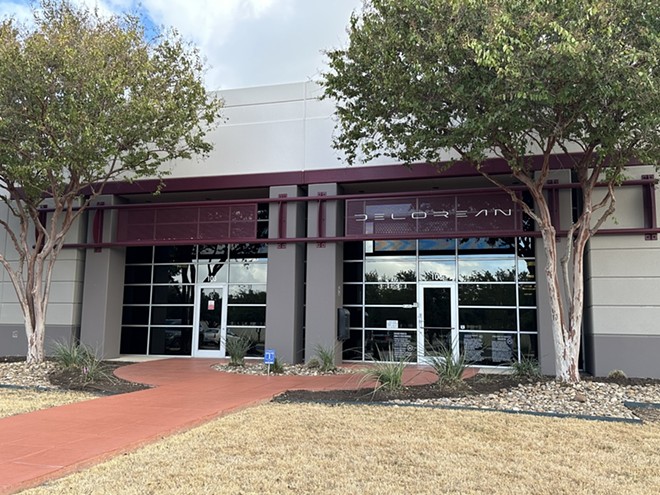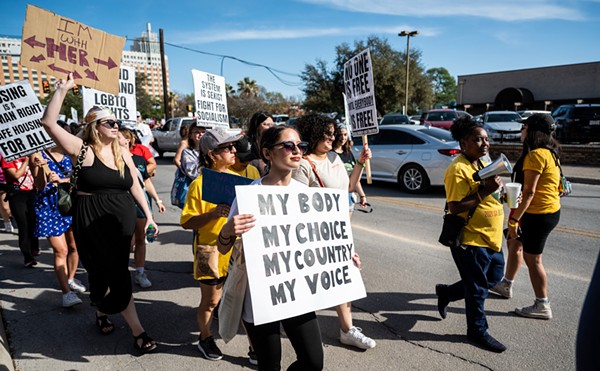Editor's Note: CityScrapes is a column of opinion and analysis.
Local officials gushed with gusto when a reconstituted DeLorean Motor Co. revealed a little more than a year ago that it was locating its headquarters in San Antonio.
"In an increasingly competitive electric vehicle market, San Antonio is ready to lead," Mayor Ron Nirenberg effused.
County Judge Nelson Wolff was no less enthusiastic: "We have invested in building the ecosystem with the engineering, tech and cyber talent, infrastructure, and supply chain that companies need. ... We're about to see those investments pay tremendous dividends."
Officials with the resurrected DeLorean Motor Co. had announced plans to bring back the stainless steel, gullwing car that starred in the Back to the Future films as an electric vehicle. And they chose the Alamo City as the site of their new headquarters, saying they would locate themselves in a new office tower at Port San Antonio, no less. As a result, our town would get 450 new engineering and managerial jobs, a big boost in the competition for electric cars and the possibility of landing a new manufacturing plant.
Both the city and the county were ready to back DeLorean with public incentives: a 10-year tax abatement from the county, and up to $562,000 from the city based on the number of jobs created. It was all full of grand hopes and promises.
Until it fizzled.
Earlier this year, DeLorean officials asked to terminate the incentive deal. The firm had seen a leadership change and scaled back the launch plans for its first car. So, despite the "ecosystem" and readiness to lead — not to mention other overheated rhetoric from local politicos — we ended up with nothing. The only positive note was that our local governments hadn't committed any money up front.
The DeLorean saga is only the latest is a long and storied history of jobs-are-coming and tremendous-dividends hype that's delivered remarkably little in the end. It reminds me of the tale of the "Texas Teleport" from 40 years before, the grand new telecommunications hub promoted by Henry Cisneros that was going to put San Antonio in the forefront of satellite communications and make the city eminently attractive to firms looking for state-of-the-art connectivity.
Homebuilder Ray Ellison promised a 3,000-acre development dubbed "New World" near Windcrest, with 15 million square feet of new office space. There would be a tie-in to a new Freeport Business Center in Southwest San Antonio. The Alamo City was touted as being uniquely situated to tie into orbiting satellites as the focus of a global network.
Cisneros and local business leaders toured New York, Chicago and San Francisco selling the idea. In mid-1984, the mayor announced that the telecom facility would be "the most comprehensive and sophisticated teleport in the nation," likely to bring "national recognition to our city as well as set the standard for teleports in the future."
Except that it really wasn't ever plausible. San Antonio had no particular locational or other advantage. As other cities pursued the teleport idea, it gradually became clear that it really wasn't needed or economically viable. And so it died.
But the idea that a San Antonio mayor could get a political boost from announcing a grand new project and the coming of hundreds, or even thousands, of new jobs was far from over. So, a constant stream of announcements of big economic development deals has followed, usually accompanied by incentives and tax abatements from the city and county.
There were the new theme parks of the 1980s — Sea World and Fiesta Texas — and the whispers that our town would be the "next Orlando." Except that didn't happen. Our two parks have consistently underperformed in terms of attendance.
There were also new computer chip manufacturing plants that opened, then closed. Add the lottery ticket printing company, the aluminum recycling plant and the sunglass manufacturer, and of course, Southwestern Bell, which evolved through a series of acquisitions back into AT&T. Those entities all came, then left.
While there have been occasional economic development and incentive success stories, like Toyota, all too often it appears we're constantly doing deals largely to make politicians and the local economic development establishment look good.
Other cities, including Austin, have managed to do better by building on their strengths and pursuing a consistent, focused strategy rather than desperately chasing deals. We could use governmental leaders who recognize and understand we must develop our economy, ones who can provide a roadmap for our economic future rather than a series of promises and announcements.
With Nirenberg term-limited out of the mayor's office, that's something we need to insist on from the next batch of candidates for city office: results rather than rhetoric.
Heywood Sanders is a professor of public policy at the University of Texas at San Antonio.
Subscribe to SA Current newsletters.
Follow us: Apple News | Google News | NewsBreak | Reddit | Instagram | Facebook | Twitter| Or sign up for our RSS Feed



















